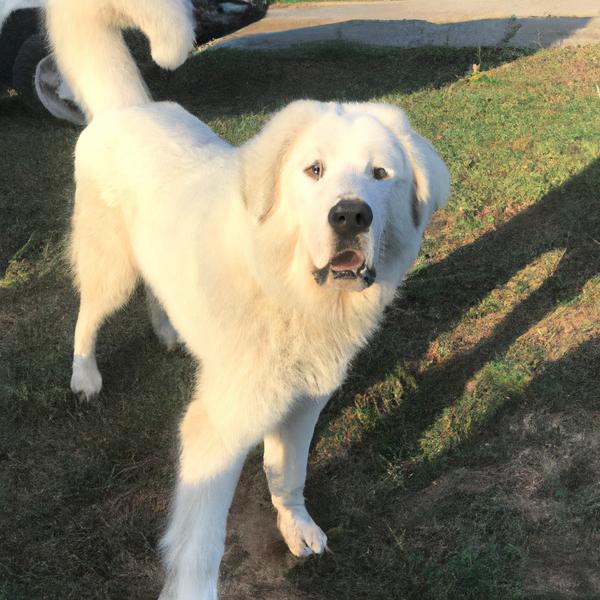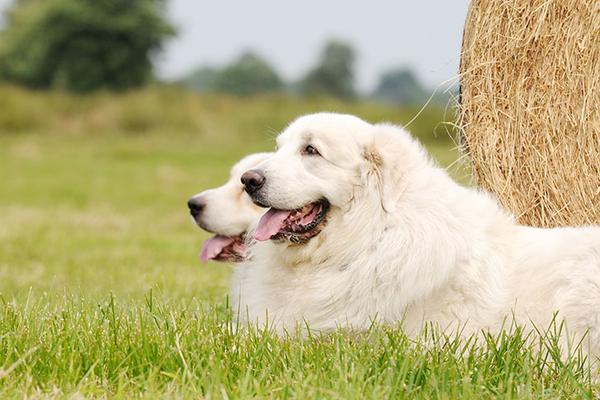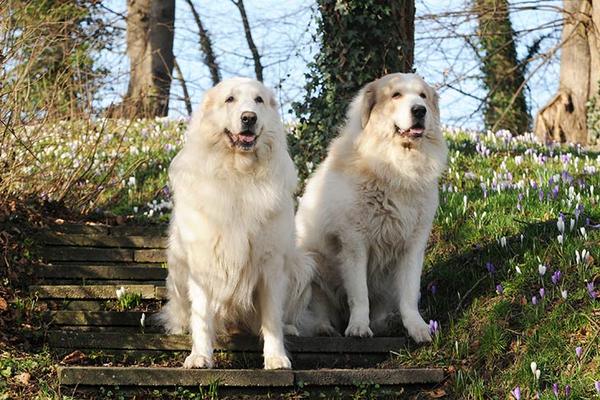Great Pyrenees
also known as Montañés Del Pirineo, Great Pyrenees, Patou, Chien De Montagne Des Pyrénées, Gos De Muntanya Dels Pirineus, Chien Des Pyrénées

 History
History
The Great Pyrenees, also known as the Pyrenean Mountain Dog, is a large and majestic breed that has a rich history dating back centuries. Originally bred in the Pyrenees Mountains of France and Spain, these dogs were used for a variety of purposes, including guarding livestock, hunting, and serving as loyal companions to the people who lived in the rugged mountains.
The Great Pyrenees was officially recognized by the American Kennel Club (AKC) in 1933, and it is also recognized by other major kennel clubs around the world, such as the United Kennel Club (UKC) and the Canadian Kennel Club (CKC).
The origins of the Great Pyrenees can be traced back to the 17th century, when the people living in the Pyrenees Mountains began breeding large, strong dogs to protect their flocks of sheep and goats from predators such as wolves and bears. Over time, these dogs evolved into the Great Pyrenees we know today, with their thick, fluffy coats, powerful build, and calm, intelligent personalities.
The breed name "Great Pyrenees" is believed to have originated from the region where the breed was developed, the Pyrenees Mountains. The breed was created by the people living in the Pyrenees Mountains who needed a dog breed that could guard their livestock from predators.
Breed Information
Is Great Pyrenees a purebred?
Purebred
What were Great Pyreneess originally used for?
Sheep Guardian
How Long Do Great Pyreneess Live? What is average life expectancy for a Great Pyrenees? How long can Great Pyreneess live?
10-12 years
The average Great Pyrenees lifespan is somewhere between 10-12 years, provided they aren't beset by any exceptional health issues or injuries.
Great Pyrenees Height & Weight
How big is a full grown Great Pyrenees?

| Height | ||||
|---|---|---|---|---|
| Average | 6 months | 12 months | 18 months | |
| Male | 27-32 inches (68.6 - 81.3 cm) | 25.0 inches (63.5 cm) | 26.0 inches (66 cm) | 29.5 inches (74.9 cm) |
| Female | 25-29 inches (63.5 - 73.7 cm) | 22.0 inches (55.9 cm) | 23.5 inches (59.7 cm) | 27.0 inches (68.6 cm) |
| Weight | ||||
|---|---|---|---|---|
| Average | 6 months | 12 months | 18 months | |
| Male | 100-140 pounds (45 - 64 kg) | 70.0 pounds (32 kg) | 90.0 pounds (41 kg) | 130.0 pounds (59 kg) |
| Female | 85-115 pounds (39 - 52 kg) | 55.0 pounds (25 kg) | 75.0 pounds (34 kg) | 100.0 pounds (45 kg) |
Do Great Pyreneess get fat easily?
![]()
![]()
![]()
![]()
![]()
The Great Pyrenees is a breed that has an average to high tendency to gain weight if their weight is not closely monitored. It is important to maintain a balance between exercise and food intake to keep them at a healthy weight. This can be achieved by scheduling at least one daily walk and engaging in regular playtime with them.
Are Great Pyreneess Hypoallergenic?
No
Unfortunately, the Great Pyrenees is not hypoallergenic, making it not a good choice for a dog lover who suffers from pet allergies.
What is a Great Pyrenees personality? What are Great Pyrenees dogs best known for?
Affectionate
Fearless
Patient
Confident
Gentle
Strong
Willed
Are Great Pyreneess heavy shedders? How Much Does a Great Pyrenees Shed?
![]()
![]()
![]()
![]()
![]()
Great Pyrenees dogs are heavy shedders, they will lose a significant amount of hair each year. To decrease the amount of shedding, you can regularly brush your Great Pyrenees. This will remove loose hair and keep his coat growing in the same direction.
What is the watchdog ability of a Great Pyrenees dog?
![]()
![]()
![]()
![]()
![]()
The Great Pyrenees dog is one of the best choice if you want a good watchdog. This breed will keep watch over you and your family at all times. This breed takes this task seriously and will typically perform its guarding duty with little to no training. This dog will require obedience training, or you can consider guard dog training to sharpen its skills.
Breed History
Where do Great Pyreneess come from?
Asia
What are Great Pyreneess descended from?
Hungarian Kuvasz, Maremmano-Abruzzese
What organizations or kennel clubs recognize/register the Great Pyrenees breed?
American Canine Registry
American Kennel Club
America's Pet Registry
Canadian Kennel Club
Dog Registry of America Inc.
Federation Cynologique Internationale
Kennel Club of Great Britain
North American Purebred Registry, Inc.
American Canine Association, Inc.
Australian National Kennel Council
Continental Kennel Club
National Kennel Club
New Zealand Kennel Club
United Kennel Club
When were Great Pyreneess first bred? How old is the Great Pyrenees breed?
Ancient Times
What Breed Group is a Great Pyrenees?
Working (AKC:1933)
Guardian Dogs (UKC)

Great Pyrenees Appearance
What color are Great Pyrenees eyes?
Brown
What color can Great Pyrenees nose be naturally?
Black
What color can Great Pyrenees coat be naturally?
White
Cream
How long is a Great Pyreneess coat?
![]()
![]()
![]()
![]()
![]()
The coat of a Great Pyrenees is longer than that of the typical dog.
How Dense Is The Great Pyrenees Coat?
![]()
![]()
![]()
![]()
![]()
What is the texture of the hair of a Great Pyrenees?
Wavy
How many puppies can a Great Pyrenees have in a litter? How many puppies can a Great Pyrenees have in her first litter?
10-12 puppies per pregnancy
A Great Pyrenees can have a litter of 10-12 puppies on average. However, it's worth noting that the size of the litters can vary greatly. Factors that can influence litter size include the health of the mother, breeding history, and genetics.
![]()
![]()
![]()
![]()
![]()
The adaptability of Great Pyrenees dogs is a well-known trait, they are known for being able to adjust well to different living environments and lifestyle changes.

Great Pyrenees Health Issues
Do Great Pyreneess have a lot of health problems?
![]()
![]()
![]()
![]()
![]()
The Great Pyrenees breed is commonly healthy with low vet costs, regular check-ups may not be as necessary but it's important to keep an eye on their health and have them checked by a veterinarian when needed.
What are the major health concerns to be aware of when owning a Great Pyrenees?
Patellar Luxation
Elbow Dysplasia
Hip Dysplasia
Bloat
Addison's Disease
What are the less significant issues to keep in mind when it comes to Great Pyreneess?
Entropion
Cataracts
What are the occasional tests recommended for Great Pyrenees breed?
Eye
Hip
Knee
Blood Test
X-Rays
Physical Examination

Great Pyrenees Needs and Activities
Do Great Pyreneess have a lot of energy?
![]()
![]()
![]()
![]()
![]()
Great Pyreneess are known for their high energy levels, so if you're looking for a more low-key dog, this breed may not be the best choice.
Do Great Pyreneess need socialization? How social are Great Pyreneess?
![]()
![]()
![]()
![]()
![]()
Great Pyrenees have above average social needs compared to other breeds.They thrive in environments where they have a lot of interaction with humans and other dogs.
How much exercise should Great Pyreneess get?
![]()
![]()
![]()
![]()
![]()
The Great Pyrenees dog requires a moderate amount of physical activity to maintain a healthy lifestyle. These breeds are ideal for people who have a moderate amount of time to devote to their pet and enjoy regular physical activity themselves. They also make great family pets as they have the energy to keep up with children and the temperament to be great companions.
How much sleep should a Great Pyrenees have? Do Great Pyreneess sleep a lot?
![]()
![]()
![]()
![]()
![]()
Great Pyreneess are active dogs that don't require as much sleep as other breeds. However, they still need enough sleep to stay healthy.
Does a Great Pyrenees drool a lot?
![]()
![]()
![]()
![]()
![]()
The Great Pyrenees is a dog that is known for its low drooling tendency. If you dislike drool marks on your clothing, the Great Pyrenees could be a suitable choice for you.
How much does it bark?
![]()
![]()
![]()
![]()
![]()
The Great Pyrenees is a vocal breed, with a tendency to bark and howl frequently. They may not be the best fit for those seeking a quiet companion. Their barks can vary and can indicate different emotions and needs.
Do Great Pyreneess exhibit aggressive behavior to safeguard their home and territory? Do they possess a natural tendency to guard?
![]()
![]()
![]()
![]()
![]()
These dogs are known for their strong territorial instinct and protective nature. They will fiercely defend their territory and are highly alert and vigilant against any perceived threat to their home and family.
Are Great Pyreneess mouthy?
![]()
![]()
![]()
![]()
![]()
What is the likelihood of a Great Pyrenees running away? Do they have a tendency to explore or wander frequently?
![]()
![]()
![]()
![]()
![]()
Do Great Pyrenees dogs have a high prey drive?
![]()
![]()
![]()
![]()
![]()
What do Great Pyreneess enjoy doing? How do I keep my Great Pyrenees busy?
Sniff, Sit, Walk, Petting, Sniffing, Mouthing, Play, Being outside, People, Tug-of-war, Run, Walking, W, Hike, Going on drives, Car rides, Hiking, Tug of war, Hide and seek, Throw the ball
What is the energy level of a Great Pyrenees? How much energy does a Great Pyrenees have?
Medium
Great Pyreneess are medium-energy dogs and typically enjoy socializing and playing casual or even sustained games of chase with other dogs. They may also have occasional periods of barking or racing around the house.
![]()
![]()
![]()
![]()
![]()
How far should a Great Pyrenees walk each week? How many miles should a Great Pyrenees walk every week?
12 miles / week
There's really no limit to how far you walk your dog as long as they're comfortable. For Great Pyrenees, it's at least 12 miles / week. Just remember to build distance and stamina gradually over time.
How much a Great Pyrenees should exercise a day? How much activity does a Great Pyrenees need?
60 minutes
In general most Great Pyreneess usually need at least 60 minutes of exercise daily. This can be spread across the day and include all sorts of high-energy activities, like walking, running and playing.
What level of grooming should be provided for a Great Pyrenees?
![]()
![]()
![]()
![]()
![]()
The Great Pyrenees is a breed of dog that requires an average amount of grooming effort.
How often should you brush a Great Pyrenees?
Weekly
Great Pyrenees should be brushed at least once a week. Of course you can give them more frequent brushes if you find that they are still shedding a lot
What are the most commonly used brushing tools for Great Pyreneess?
Pin Brush
Comb
Deshedder
Nail Clipper
Costs
How many cups of food does a Great Pyrenees eat?
4.5 cups
For an average 100-140 pound (45 - 64 kg) Great Pyrenees feed 4.5 cups daily. But, keep in mind, the amount you feed is going to be dependent on the quality of the food you are feeding.
How Much Does a Great Pyrenees Cost Daily?
$4.20 - $4.90 / day
The average cost of a Great Pyrenees is somewhere $4.20 - $4.90 per day.
How Much Does a Great Pyrenees Cost Per Month?
$126 - $147 / month
The average per month expenses of a Great Pyrenees is between $126 - $147. This makes an average of $1512 - $1764 per year. It will be on the higher side when the dog is still small because it will need more frequent visits to the vet, shots.
Great Pyrenees Characteristic
How intelligent is a Great Pyrenees?
![]()
![]()
![]()
![]()
![]()
Great Pyreneess has average obedience intelligence. But, they're also independent thinkers. The Great Pyrenees is a breed with an exceptionally high IQ and may get into mischief if left to their own devices.
How sensitive is a Great Pyrenees dog?
![]()
![]()
![]()
![]()
![]()
This dog breed is more sensitive than others and easily overwhelmed by new surroundings and people. They need gentle handling and a calm, stable home environment with positive reinforcement training.
Are Great Pyrenees dogs affectionate?
![]()
![]()
![]()
![]()
![]()
Do Great Pyrenees do well in apartments? Are Great Pyreneess good indoor dogs?
![]()
![]()
![]()
![]()
![]()
It's not recommended to keep the Great Pyrenees in an apartment, but this breed make good apartment dogs as long as they get to spend a good amount of time outside of the apartment. Great Pyreneess living in apartments will need plenty of physical exercise and stimulation throughout the day to remain happy and well-behaved.
Are Great Pyreneess good with kids? Are Great Pyreneess good around children?
![]()
![]()
![]()
![]()
![]()
Great Pyreneess are kid-friendly dogs. They are good with children and excellent dogs with children if they are socialized and trained at a young age.
Are Great Pyreneess good for elderly?
![]()
![]()
![]()
![]()
![]()
Are Great Pyreneess good with cats? How friendly Great Pyreneess are toward cats?
![]()
![]()
![]()
![]()
![]()
Great Pyreneess are one of the best dogs for cats. They're accept cats readily as part of the family. However, this dog breed should be trained to not chase after the kitty early on
Do Great Pyrenees dogs get along with other dogs? Are Great Pyreneess OK with other dogs?
![]()
![]()
![]()
![]()
![]()
Great Pyreneess are average friendly towards other dogs. If they are raised with other dogs, they are likely to get along with them. And, if they are socialized properly from a young age, they will usually be great with other dogs.
How do Great Pyrenees dogs interact with other pets? Are they considered pet-friendly?
![]()
![]()
![]()
![]()
![]()
Are Great Pyreneess friendly with strangers?
![]()
![]()
![]()
![]()
![]()
Great Pyreneess are average friendly around strangers. They can be wary around strangers and a little standoffish. Early socialisation is key.
Do Great Pyreneess like to play? Are Great Pyreneess playful?
![]()
![]()
![]()
![]()
![]()
Great Pyreneess are not the most playful dog breed.
Are Great Pyrenees easily trained?
![]()
![]()
![]()
![]()
![]()
Great Pyrenees dogs are known for their ease of training and ability to learn quickly, making them a popular choice for pet owners and trainers alike.
 Pros & Cons
Pros & Cons
Pros
- Loyal
Great Pyrenees are known for their loyalty and strong bond with their owners. - Protective
They are naturally protective of their family and make great watchdogs. - Cat Friendly
Great Pyrenees have a friendly disposition towards cats. - Good with children
They are gentle and patient with children, making them great family pets.
Cons
- Tendency to gain weight
Neglecting to watch a Great Pyrenees's weight can result in unnecessary weight gain. - Shedding
Great Pyreneess dog breed that sheds heavily. - Barking
This dog's loud bark is a defining characteristic of its breed. - Not Hypoallergenic
If you have allergies, you may want to avoid Great Pyreneess, as they have been known to cause allergic reactions. - Not suitable for office environment
Great Pyreneess may struggle to adapt to an office environment. - Not Apartment Friendly
Great Pyrenees breeds may not be well-suited for indoor living. - Size
Great Pyrenees are large dogs and require a lot of space.
Compare Great Pyrenees with other dogs
- Great Pyrenees vs English King
- Great Pyrenees vs Alaskan Malador
- Great Pyrenees vs Pembroke Sheltie
- Great Pyrenees vs Mini St. Bernard
- Great Pyrenees vs Rotticorso
- Great Pyrenees vs Wirehaired Vizsla
- Great Pyrenees vs Maltese
- Great Pyrenees vs Pyrenees Husky
- Great Pyrenees vs Bouberman
- Great Pyrenees vs Imo-Inu